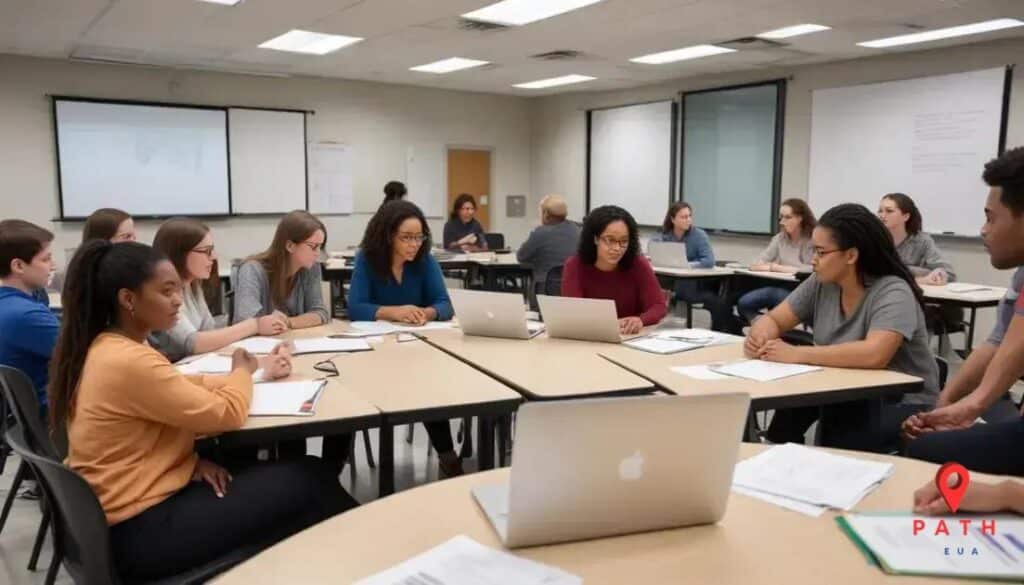Negotiated rulemaking for higher education: a game changer

Anúncios
Negotiated rulemaking for higher education involves collaborative policy-making that includes diverse stakeholders, fostering inclusivity and responsiveness to the needs of institutions and students.
Negotiated rulemaking for higher education is reshaping how institutions create policies that impact students and faculty. Curious about its effects? Let’s delve into this transformative approach.
Understanding negotiated rulemaking
Understanding negotiated rulemaking is essential for grasping how policies in higher education are developed. This process involves collaboration among various stakeholders, including students, faculty, and government representatives.
Through collective discussions, these parties can address important issues and create rules that reflect the needs of everyone involved.
The Process of Negotiated Rulemaking
The process typically involves several crucial steps that can enhance transparency and trust. These include gathering stakeholders, sharing relevant data, and facilitating open discussions.
Having a structured approach can lead to more effective outcomes and sustainable policies.
Anúncios
Key Benefits
- Encourages diverse perspectives and inclusivity.
- Creates a sense of ownership among stakeholders.
- Enhances the likelihood of successful implementation of policies.
For a deeper understanding of the principles and practices involved, you can explore the resources available at the U.S. Department of Education.
| Topic | Key Insight | Consequence |
|---|---|---|
| Collaborative Policy | Involves diverse stakeholders | Inclusive and responsive policies |
| Stakeholder Engagement | Voices from all parties included | Builds trust and ownership |
| Negotiation Steps | Identify, prepare, and negotiate | Structured, transparent process |
| Communication Barriers | Misunderstandings can arise | Slows policy development |
| Conflicting Interests | Stakeholders have different goals | Difficult to reach consensus |
| Training and Resources | Support needed for engagement | Improves negotiation outcomes |
| Future Trends | Policies will be more inclusive | Better support for student needs |
| Equity Focus | Address systemic disparities | Improves access and opportunity |
The importance of stakeholder involvement
The importance of stakeholder involvement in negotiated rulemaking cannot be overstated. Engaging various parties ensures that diverse perspectives are considered.
This process helps build trust and promotes collaborative solutions that address the concerns of all involved.
Why Stakeholder Involvement Matters
Involving stakeholders can lead to more effective outcomes in policy development. It enhances transparency and encourages open dialogue.
When stakeholders feel heard, they are more likely to support the final outcomes.
Key Benefits of Engagement
- Fosters a sense of community among participants.
- Promotes the sharing of valuable insights and best practices.
- Improves the legitimacy and acceptance of the policies created.
For additional insights on stakeholder involvement in policy making, visit the website of the National Governor’s Association.
Steps in the negotiated process

The steps in the negotiated process are crucial for effective policy development in higher education. Each step helps in shaping the final outcome in a collaborative manner.
Typically, the process begins by identifying the need for rulemaking and gathering relevant stakeholders.
Key Steps in the Process
1. **Identifying Stakeholders**: Recognizing who should be involved is key for a balanced discussion.
2. **Preparing Background Information**: Stakeholders should review existing rules and data to understand the context.
3. **Facilitating Negotiations**: Conducting the actual negotiation meetings where ideas and concerns are shared openly.
This process ensures that everyone’s voice is heard, and creates rules that are applicable and effective.
Importance of Structure
Having a structured approach allows participants to stay organized and focused on the goals. This increases efficiency and fosters constructive dialogue.
For more detailed guidelines on rulemaking steps, visit the official Regulatory Information webpage.
Challenges faced in implementation
Challenges faced in the implementation of negotiated rulemaking can significantly affect the effectiveness of the process. Identifying and addressing these challenges is crucial for achieving successful outcomes.
Some common obstacles arise from differing stakeholder interests and the complexity of the rules being negotiated.
Common Challenges
1. **Diverse Interests**: Stakeholders often have conflicting priorities, making compromise difficult.
2. **Lack of Resources**: Many institutions may struggle to allocate enough time or funding for the negotiation process.
3. **Communication Barriers**: Misunderstandings can occur when participants do not communicate effectively, hindering progress.
These factors can slow down the process and create frustration among those involved.
Overcoming Implementation Challenges
- Establish clear communication channels to facilitate dialogue.
- Focus on building consensus among parties through collaboration.
- Provide adequate training and resources for stakeholders involved.
For further insights on overcoming implementation challenges, you can refer to the resource from the Council of State Governments.
Future implications for higher education policies
The future implications for higher education policies arising from negotiated rulemaking are significant. As more stakeholders participate in the process, we can expect a shift towards more inclusive and responsive policies.
This approach can lead to policies that better address the changing needs of students, educators, and institutions.
Potential Changes Ahead
1. **Increased Flexibility**: Policies may evolve to allow for more adaptive learning environments and curricular changes.
2. **Enhanced Collaboration**: Institutions might engage more with local communities and stakeholders to address educational gaps.
3. **Focus on Equity**: Future policies may prioritize equity, ensuring that all students have access to resources and opportunities.
These changes reflect a growing understanding that policy should support the diverse needs of the educational landscape.
Monitoring and Evaluation
- Continuous assessment of policy impact will become essential to maintain relevance.
- Stakeholder feedback will be vital in shaping ongoing policy adjustments.
- Transparency in decision-making processes will help build trust in the system.
For more information on trends in higher education policy, visit the U.S. Department of Education website.
In summary, the power of negotiated rulemaking in higher education
Negotiated rulemaking has the potential to transform how policies are created in higher education. By involving diverse stakeholders, institutions can develop rules that truly meet the needs of their communities.
As we look to the future, it’s clear that this collaborative approach promotes flexibility, equity, and transparency in education policies. By addressing challenges and embracing new ideas, we can drive meaningful change.
With increased participation and focus on the evolving landscape, the future of higher education will likely be more inclusive and effective in serving all students.





